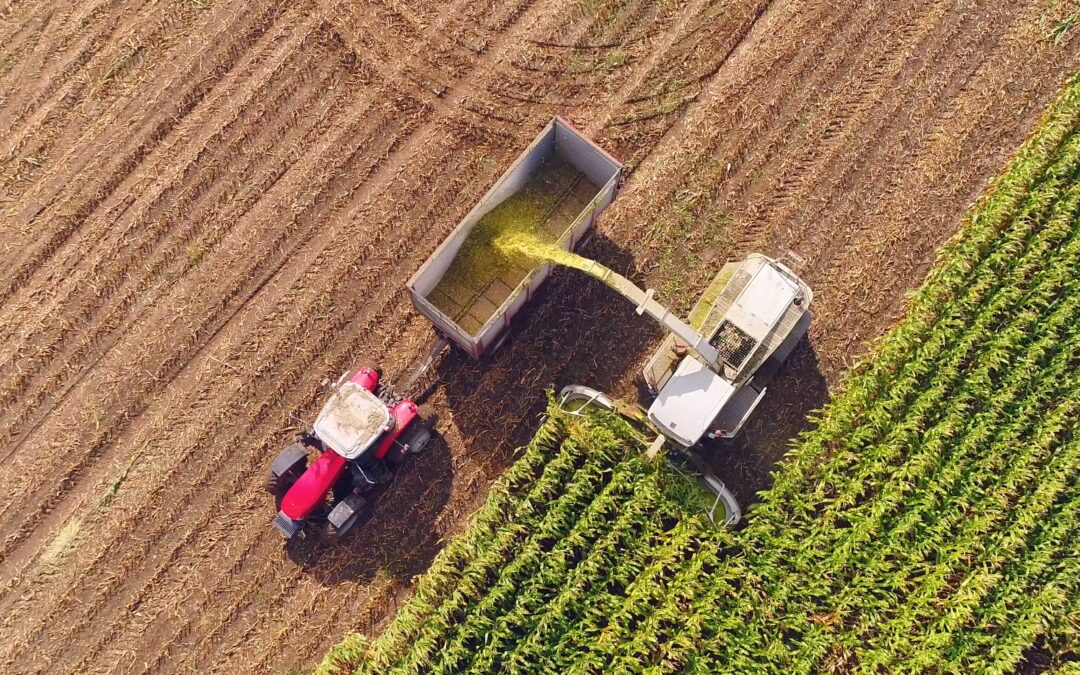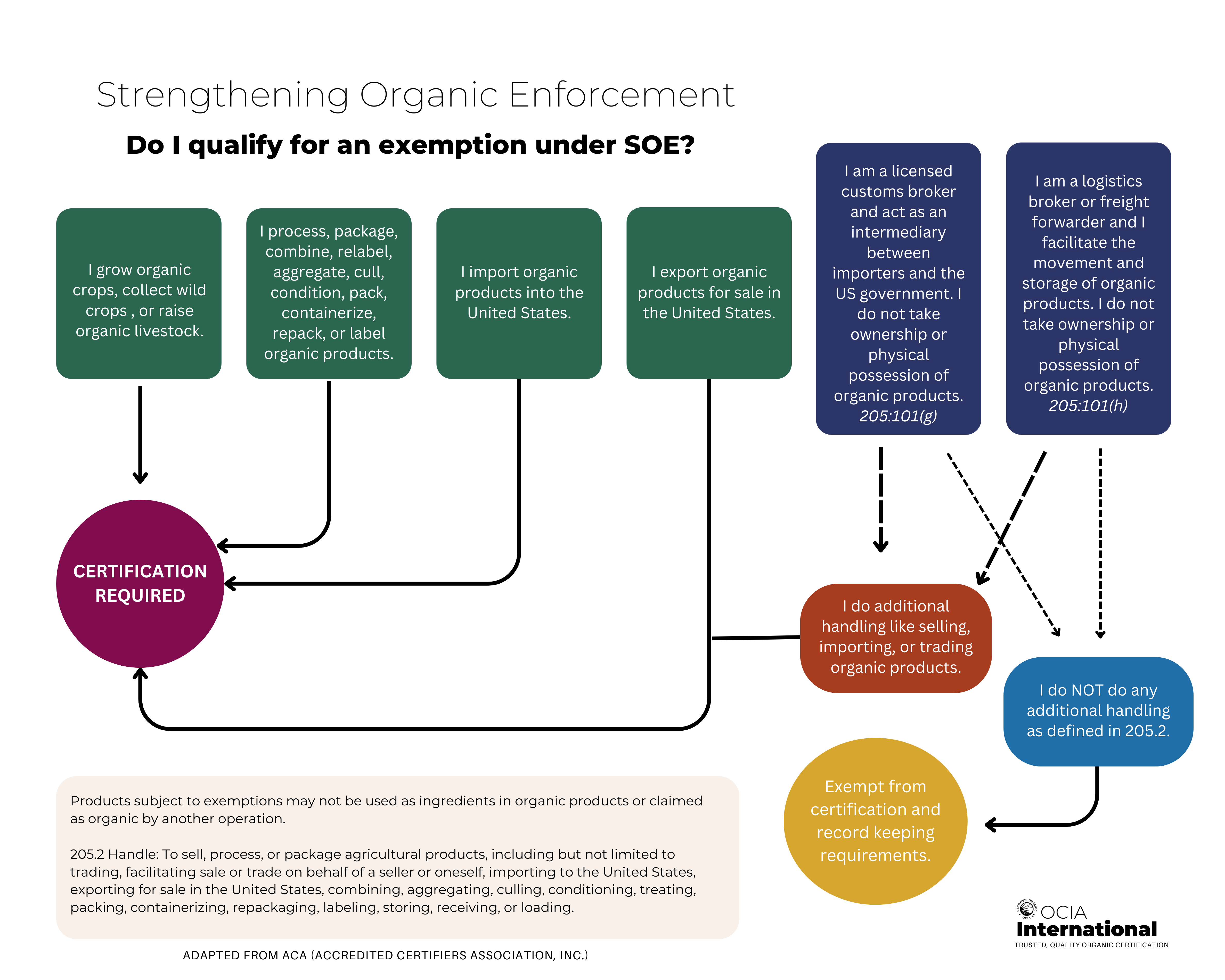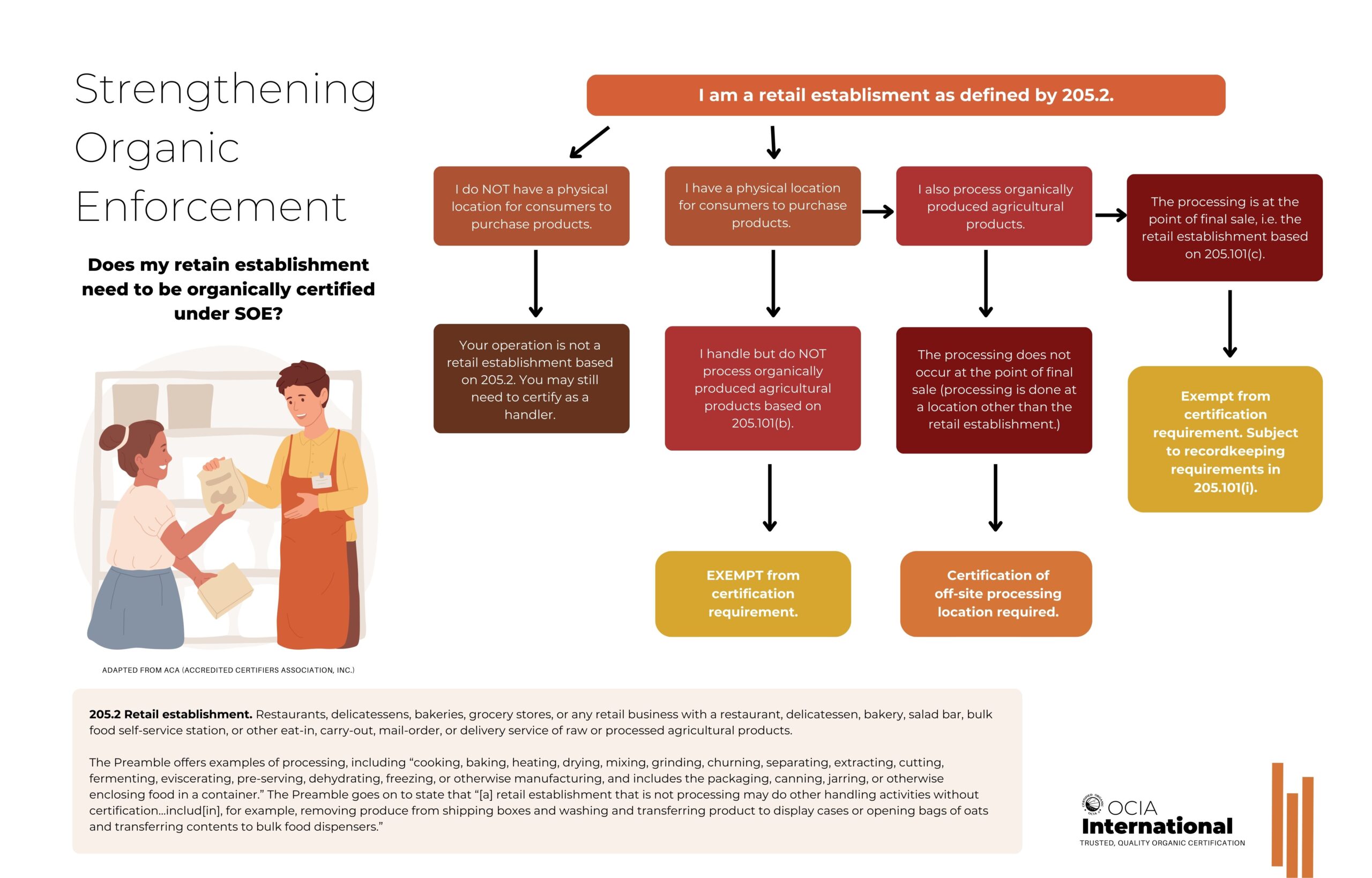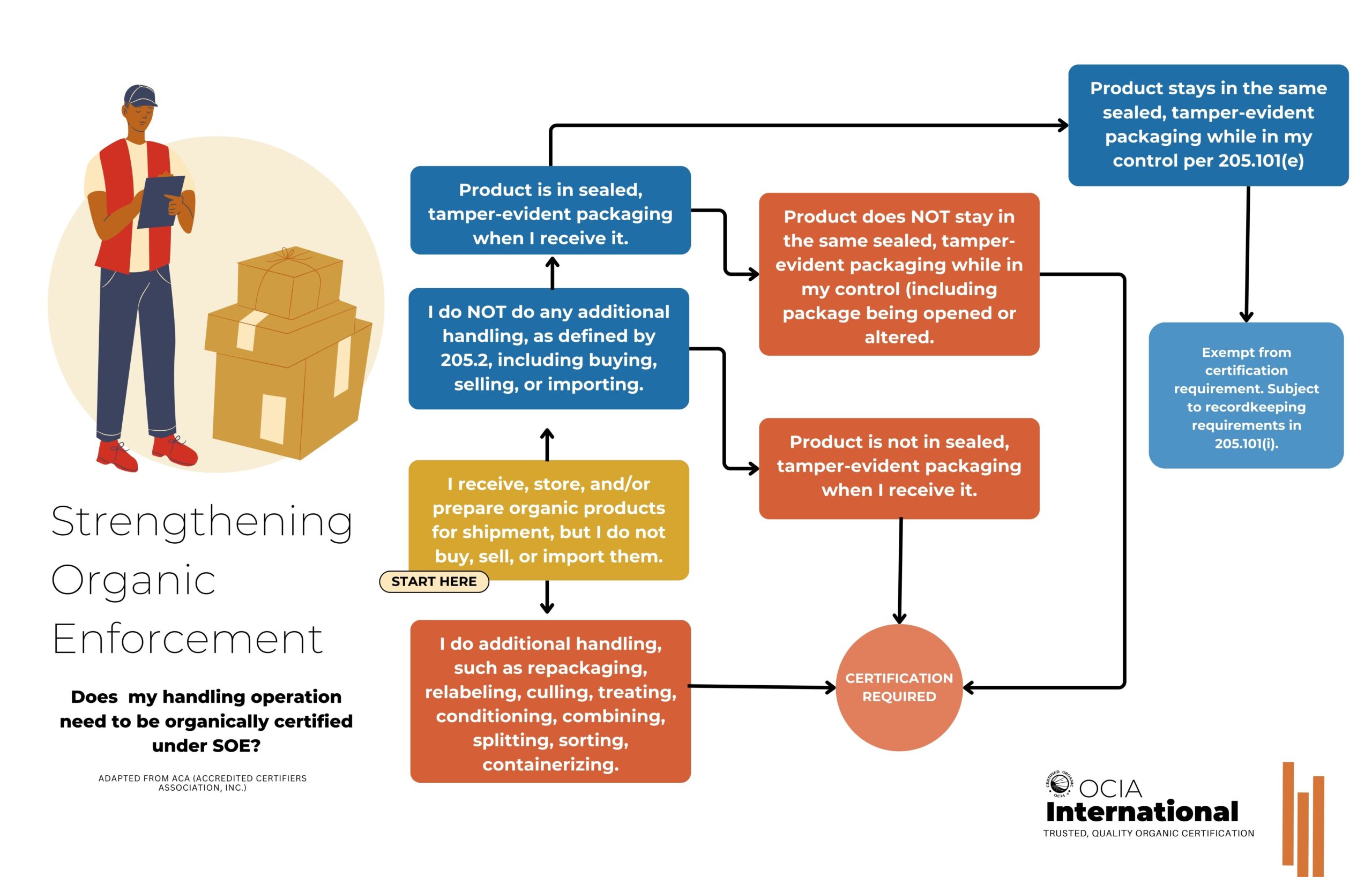The USDA will implement Strengthening Organic Enforcement (SOE) on March 19, 2024. The new regulations will impact all segments of the organic industry. The most common SOE questions are answered below.
TABLE OF CONTENTS
-
- What is Strengthening Organic Enforcement (SOE)?
- What is the purpose of SOE?
- Why is SOE necessary now?
- Who will SOE impact?
- Who qualifies for an exemption under SOE?
- I work with uncertified suppliers/brokers. Do they need to be certified?
- What if my supplier isn’t certified by March 19, 2024?
- I purchase imported ingredients, but I don’t actually import the ingredients myself. Do I need to maintain a NOP Import Certificate?
- What is a fraud prevention plan?
- What additional resources are available to ensure compliance with Strengthening Organic Enforcement (SOE)?
- Will I need to certify my retail establishment if I sell organic products?
- Does my handling operation need to be certified?
Questions?
Do you have a question about Strengthening Organic Enforcement that isn’t answered here? Let us know! We’ll do our best to respond to your question within two business days.
What is Strengthening Organic Enforcement (SOE)?
Strengthening Organic Enforcement (SOE), the largest update to the USDA organic regulations since 2002, will go into effect on March 19, 2024. The comprehensive update will impact all aspects of the organic supply chain, with handlers and processors experiencing the most significant changes. New SOE rules will require almost all handlers and processors of organic products to obtain organic certification to continue using the USDA Organic Seal on their products. This is a marked change from previous organic regulations which included little oversight for this segment of the organic industry.
What is the purpose of SOE?
The goal of the sweeping update is to strengthen the oversight and enforcement of organic regulations to ensure the integrity of the organic supply chain. Guaranteeing organic integrity requires:
-
- Transparent supply chains
- Trusted interactions between businesses
- Tools to verify product legitimacy
Prior to SOE, mechanisms for guaranteeing these necessary elements were inconsistently implemented. Increasingly complex supply chains that crossed large geographic areas added to this difficult task.
Why is SOE necessary now?
The organic industry has experienced massive growth since the USDA first implemented organic regulations in the 1990s. Between 2012 and 2021 alone annual organic sales increased by nearly $30 billion. While other sectors of the economy stagnated during the Covid-19 pandemic, the organic sector continued to see growth due to ever increasing consumer demand.
Meeting this growing consumer demand has required increasingly complex organic supply chains. In the 1990s when organic regulations were first implemented, most organic products were produced and sold in local and regional markets. Today, the organic supply chain often crosses countries and continents.
Consider the supply chain associated with an organic egg.
In the 1990s, the supply chain for an organic egg almost always existed within a small geographic area:
-
- A certified organic farmer produced organic corn.
- The farmer transported organic corn to a neighboring certified egg producer.
- The organic egg producer used the organic corn as part of their organic chicken feed.
- The egg producer collected their organic eggs and transported them to a local farmers’ market where the producer sold the eggs.
While supply chains like the above still exist today, many supply chains are incredibly complex. Consider one potential supply chain for an organic egg as outlined on page 3550 of the final SOE ruling:
-
- A certified organic farm produces organic corn.
- The farmer transports organic corn by uncertified truck to a local grain elevator and aggregates the corn with other organic corn from nearby producers.
- An uncertified commodity trader buys the corn.
- The corn is transported via uncertified truck to an uncertified storage facility; both transport and storage are subcontracted and are not owned by the commodity trader.
- The commodity trader sells the corn to a certified organic grain supplier; the two parties remain anonymous because they use an uncertified broker to facilitate the transaction.
- The corn is transported via uncertified rail and river barge to the grain supplier; it is transloaded and stored temporarily several times before being delivered to the certified grain supplier.
- The certified organic grain supplier stores the corn and combines it with imported organic corn purchased from an importer via an uncertified broker.
- The certified grain supplier sells the corn to a certified organic feed processer; the corn is transported via an uncertified truck.
- The certified processer combines the corn with several other ingredients to create organic chicken feed.
- The certified processer sells the feed to a certified organic egg producer and transports it via an uncertified truck.
- The certified organic egg producer sells organic eggs to an uncertified distributor.
- The uncertified distributor sells the organic eggs to a retailer prior to final sale to the consumer.
Although opportunities for mishandling of organic products existed in the 1990s, simpler supply chains made mishandling less likely and easier to trace than today’s complex, multi-regional supply chains. The above example illustrates the challenges associated with maintaining organic integrity. Without clear handling and record keeping standards, tracing the journey of a product to ensure organic integrity becomes nearly impossible.
Who will SOE impact?
SOE will primarily impact previously uncertified processors and handlers where the highest risk of compromise exists due to previously unclear regulations.
Under new regulations, processors of organic agricultural products must be certified. This means that a wide range of previously uncertified operations must obtain certification prior to March 19, 2024.
Operators performing specific activities, like those below, must obtain certification:
- Combining
- Aggregating
- Culling
- Conditioning
- Treating
- Packing
- Containerizing
- Repackaging
- Labeling
- Storing
- Receiving
- Loading
- Coffee Roasters
Locations performing specific activities also must obtain certification:
- Ports of Entry
- Grain Elevators
- Bakeries and kitchens serving grocery chains
- Warehouses
Individual operators who act as freelancers must be certified if they act as:
- Sales brokers
- Commodity traders
- Ingredient sources
- Importers
- Exporters
Strengthening Organic Enforcement will require previously uncertified operations who are part of the organic supply chain to obtain certification. Few exemptions will be granted, and most operations receiving exemptions will be prohibited from displaying the USDA organic seal.
Who qualifies for an exemption under SOE?
USDA will provide very few exemptions for organic certification under SOE, and only operations conducting low-risk activities will be eligible to receive an exemption.
Operations eligible for exemptions include:
-
- Retail establishments that sell certified organic products directly to consumers without alteration, such as a grocery store with an organic section or a bakery that sells pre-packaged organic goods.
- Restaurants that prepare raw and ready-to-eat food from products that were originally labeled as “100 percent organic,” “organic,” or “made with organic”.
- Warehouses and cold storage facilities that exclusively handle tamper-proof packaged organic products.
The below chart illustrates who is likely to be granted an exemption and who is unlikely to be granted an exemption. Processors and handlers should still plan to consult an accredited certifier to confirm eligibility for an exemption. A larger version of the chart can be viewed HERE.
I work with uncertified suppliers/brokers. Do they need to be certified?
Most suppliers/brokers will need to obtain certification by the March 19, 2024 deadline. This is true of suppliers/brokers who may not have physical contact with agricultural products due to their potential to impact organic integrity.
Exemptions may be provided for:
-
- Brokers who do not take physical possession of goods, and who do not sell, import, or trade agricultural products. This includes:
- Customs brokers who facilitate entry of products into the US and must file NOP Import Certificate data with US Custom and Border Protection’s Automated Commercial Environment import entry system.
- Logistics brokers who arrange for shipping, storage, transport and other movement of organic agricultural products.
- Sales brokers that purchase/receive a product in its final retail packaging. However, the exemption will not apply to sales brokers, traders, and other handlers who buy and sell products not in their final retail packaging.
- Brokers who do not take physical possession of goods, and who do not sell, import, or trade agricultural products. This includes:
It is important to note that operations that sell, trade, or facilitate the sale or trade of agricultural products on behalf of a seller must be certified. This means that sales brokers must obtain certification.
Certified operators who work with individuals claiming exemptions (e.g. storage warehouses) must complete an exempt handler affidavit to help OCIA International determine if the operation is truly exempt.
An exempt handler affidavit in English can be found HERE. An exempt handler affidavit in Spanish can be found HERE. If you have questions, please contact your certification coordinator.
What if my supplier isn’t certified by March 19, 2024?
Unless an uncertified supplier is exempt from certification, certified organic operators will not be able to work with uncertified suppliers after March 19, 2024.
If you work with an uncertified supplier and wish to continue working with them after March 19, 2024, they must begin the organic certification process now. Remember that the organic certification process can take several months, and certification agencies are likely to see an increase in last minute applicants as we draw closer to the implementation of SOE.
I’ve purchased imported ingredients, but I don’t actually import the ingredients myself. Do I need to maintain an NOP Import Certificate?
You will not need to maintain an NOP Import Certificate. However, it will be necessary to maintain a thorough audit trail back to your certified supplier showing the source transfer of ownership and transportation of the product/ingredient. The operation who imports the ingredients will need to have a way to receive and maintain the NOP import certificates.
What is a fraud prevention plan?
A fraud prevention plan documents that practices and procedures implemented by an organic operator in order to detect, prevent, and mitigate fraud.
A fraud prevention plan must be included in an operation’s Organic System Plan (OSP). Fraud plans will be unique to each individual operation based on an operation’s activities, scope, and complexity. A template to assist operations with documenting their plan is available here.
The primary purpose of a fraud prevention plan is to verify the organic status of suppliers and organic products. Successful fraud plans allow for certifying agents to easily verify compliance during their on-site inspections and supply chain traceability audits.
Most fraud plans will include the following, as outlined on page 3603 of the final SOE ruling:
-
- Map/inventory of supply chain and identification of suppliers
- Clear identification of critical control points in the supply chain where organic fraud/loss of organic status are most likely to occur
- Vulnerability assessment identifying weaknesses in the operation’s practices/supply chain
- Practices for verifying the organic status of any products acquired/used by an operation
- Mitigation measures to correct vulnerabilities and minimize risks
- Monitoring practices and verification tools to assess the effectiveness of mitigation measures
- Process for reporting suspected organic fraud to certifying agents and the NOP
What additional resources are available to ensure compliance with Strengthening Organic Enforcement (SOE)?
Organic certification agencies and the USDA are committed to providing operators with resources to effectively navigate the new SOE standards and regulations. In addition to email updates from your certifier, operators have access to the below USDA resources:
-
- Side-by-Side Comparison: document comparing Strengthening Organic Enforcement (SOE) to the Organic Regulations (7 CFR Part 205) previously in effect.
- SOE Final Rule Primers: Summarizes key takeaways from Strengthening Organic Enforcement (SOE).
- SOE Final Rule: Complete text of the final Strengthening Organic Enforcement (SOE) rule.
- NOP Organic Integrity Learning Center: NOP offers a comprehensive training course on Strengthening Organic Enforcement (SOE). We recommend all operators take advantage of this free learning opportunity.
As with all new standards and regulations, we anticipate additional updates/revisions will be made to how SOE is implemented in order to foster continuous improvement and ensure the integrity of the organic supply chain.
Will I need to certify my retail establishment under Strengthening Organic Enforcement (SOE) if I sell organic products?
Does my handling operation need certified under SOE?
Learn more about organic agriculture and organic certification.
- Should you transition to Organic?: The decision to transition a conventional operation to organic is deeply personal. Organic certification requires resources, like time and money, and perseverance in the face of the challenges that you will inevitably encounter along the way. Is transitioning to organic the right step for your operation?
- Organic Certification Process:All operators seeking initial organic certification must complete a similar six step process regardless of which certification agency they partner with. The certification process can feel intimidating at first, but knowing what to expect can help alleviate much of the stress you might initially feel.
- Organic System Plan: Every operator must submit an organic system plan. But what is included? And how will the plan provided YOU with benefits beyond certification?
- Healthy Soil: Cultivating healthy soil requires establishing ecological balance and increasing biological diversity. But how can you establish healthy soil on your farm?
Every operator’s path to organic certification is different. Learn more about about the different paths to organic certification in our “Operator Spotlight” series.
- Kollasch Family Transitions 10,000 Acres to Organic: Matt Kollasch and his father were operating a 10,000-acre conventional farm when they made the decision to transition to organic. The cost of operating conventionally had become unsustainable.
- Chapters Support Randy Mosel’s Organic Transition: In 2015, Mosel transitioned his operation from dairy to crop production. He noted that his local OCIA chapter helped him in the transition process.
- Crisis Catalyzed Jack Geiger’s Transition to Organic: The farm crisis of the 1980s forced Jack Geiger’s family to consider farming methods that required fewer and less expensive inputs. They naturally turned to organics.




